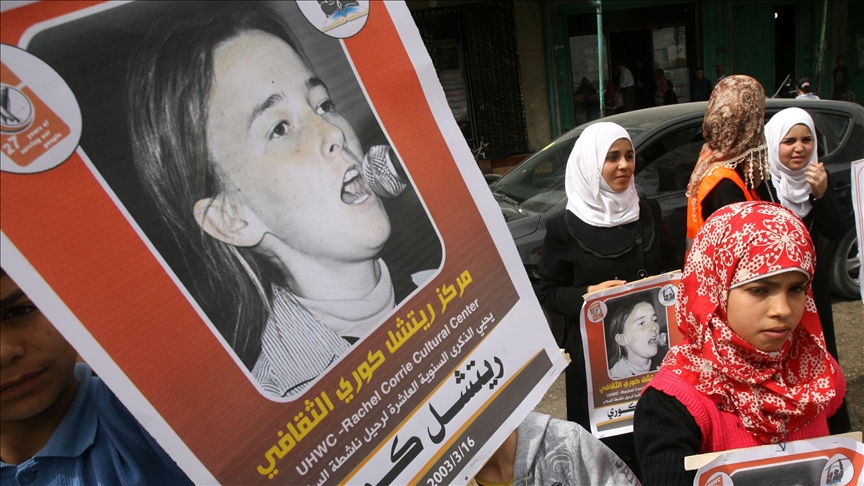JERUSALEM
In southern Gaza 21 years ago today, American activist Rachel Corrie was crushed to death by an Israeli bulldozer she was trying to stop from reducing the home of a Palestinian family to rubble.
Through her activism in Gaza, Corrie helped bring to light many rights violations perpetrated by Israel against Palestinians, becoming a symbol of the Palestinian cause.

Corrie, who devoted her life to defending the rights of Palestinians, was very much taken aback by what was happening under Israeli occupation.
In an email to her mother, Corrie wrote: “It is most difficult for me to think about what’s going on here when I sit down to write back to the United States.”
She added: “I don’t know if many of the children here have ever existed without tank-shell holes in their walls and the towers of an occupying army surveying them constantly from the near horizons.
“I think, although I’m not entirely sure, that even the smallest of these children understand that life is not like this everywhere.”
An Israeli investigation concluded that her death was an accident, in findings that has satisfied neither Corrie’s parents, nor many others worldwide.
In 2005, Craig and Cindy Corrie filed a civil lawsuit against Israel, asserting that she had either been intentionally killed or that the soldiers had showed criminal negligence. They sued for a symbolic one US dollar in damages.
An Israeli court rejected the lawsuit in 2012, ruling that the Israeli government was not responsible for her death.
The ruling was slammed by human rights organizations, such as Amnesty International and Human Rights Watch, as well as activists.
Corrie has since become a symbol of the fight for Palestinian rights.
An Irish aid ship that set out for Gaza in 2010 named itself after Rachel and her story has been told in several documentary films about the plight of Palestinians.
Rachel Corrie
On a Sunday 21 years ago, the 23-year-old American woman was killed by an Israeli bulldozer while protesting the demolition of Palestinian homes in the southern town of Rafah in the Gaza Strip. Since then, she has become an icon of solidarity with the Palestinians.
Born on April 10, 1979, in Olympia, Washington, Rachel Corrie had dedicated her life to human rights, defending Palestinian rights in particular.
In 2003, she traveled to Palestine for her senior-year college assignment — to connect her hometown with Rafah, as part of a sister cities project.
During her stay, she engaged with members of the International Solidarity Movement, a pro-Palestinian non-governmental organization.
There, on March 16, she stood in front of an Israeli bulldozer, staging a peaceful protest to protect the home of a Palestinian family from demolition.
She was crushed to death when the bulldozer driver ran her over, according to witnesses.
Gazans received news of her murder with grief and horror, describing her as a “martyr” and staging a massive funeral for the American activist.
Near the home Corrie was protesting to save, Palestinians launched an annual sports championship in her memory.
Many films, plays, and books were written in memory of Corrie, whose name was given to many schools, hospitals and newborn children in Palestine.
The letters Corrie wrote to her family from Palestine were compiled and published as a book with the title, Let Me Stand Alone.

